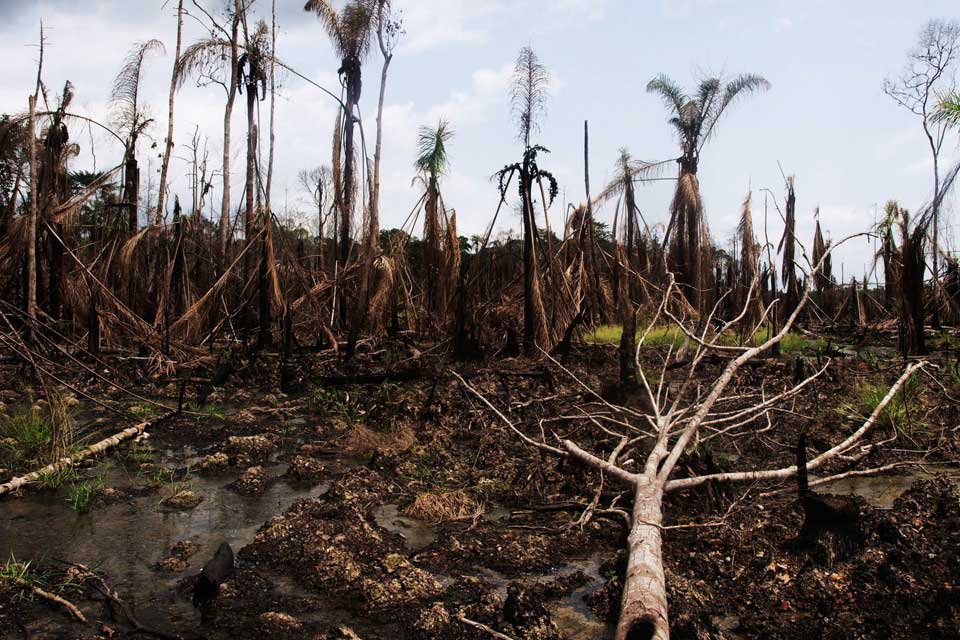A Rome Statue crime of Ecocide would help – but it is neither straightforward, nor a panacea.

The campaign to criminalise ‘ecocide’ has gained momentum in recent years. In this blog, Dr Rachel Killean explores the possibilities and challenges associated with introducing ecocide as a new international crime at the International Criminal Court.
Introduction
When translated from its Greek and Latin predecessors, the word ‘ecocide’ simply refers to the act of ‘killing our home.’ The term first emerged in response to the devastating environmental harms caused by the US’ use of Agent Orange in the Vietnam War. It has since been used to describe oil extraction in the Alberta Tar Sands, environmental degradation in the Niger Delta region, and illegal mining in Venezuela. Others have also used the term to describe the range of ordinary acts that contribute to environmental degradation, such as releasing micro plastics into the oceans, emitting greenhouse gases and disproportionately using pesticides.
Debates around whether ecocide could be prosecuted as an international crime date back to the 1970s, and can be found in various discussions within UN institutions throughout the 1970s, 1980s, and 1990s. While these early debates failed to result in any concrete action, calls to criminalise ecocide at an international level have received increased political backing in recent years. The Republic of Vanuatu, the Republic of Maldives, Belgium and the European Parliament are amongst those that have expressed support for an international crime of ecocide.
Calls to criminalise ecocide often argue in favour of incorporating it into the mandate of the International Criminal Court (ICC) – a permanent international court tasked with prosecuting those crimes of most concern to the international community. Building on the recent political momentum, the Stop Ecocide campaign has recently convened a panel of experts to draft a definition of ecocide capable of being incorporated into the ICC’s Statute (the ‘Rome Statute’).
In a recent research brief for the Environmental Justice Network Ireland, I worked with a group of colleagues from Queen’s University Belfast to explore the current gaps in international accountability for environmental crimes, the possible benefits of criminalising ecocide, the prospects for a future crime of ecocide, and the limitations of criminalisation as a response to environmental harm. In this blog, I summarise some of our findings.
Gaps in the existing international criminal framework
The ICC currently has jurisdiction over four international crimes: war crimes, genocide, crimes against humanity and the crime of aggression. Environmental harm is only explicitly referenced in relation to war crimes. Dubbed the first ‘eco-centric war crime’, Article 8(2)(b)(iv) prohibits:
‘… intentionally launching an attack in the knowledge that such attack will cause… widespread, long-term and severe damage to the non-human environment which would be clearly excessive in relation to the concrete and direct overall military advantage anticipated.’
This Article can be critiqued as almost impossible to successfully prosecute. The reference to ‘widespread, long-term and severe damage’ sets the threshold of harm very high, while the requirement that the accused knew that the attack would cause damage sets a similarly high threshold for proving intent. Furthermore, the reference to harm that is ‘clearly excessive in relation to the concrete and direct overall military advantage anticipated’ introduces a subjective proportionality test based on the knowledge available to the accused at the time. This makes it difficult to prove that the harm was excessive. In light of these challenges, it is perhaps unsurprising that there have been no prosecutions using this Article to date.
Although Article 8(2)(b)(iv) is the only specifically eco-centric crime in the Rome Statute, it is theoretically possible to use the other three crimes to prosecute environmental destruction. For example, genocide prohibits ‘deliberately inflicting on the group conditions of life calculated to bring about its physical destruction’, which could arguably include environmental destruction. Environmental destruction could also be considered a crime against humanity if it was used to subject populations to ‘conditions of life…calculated to bring about the destruction of part of the population.’ If attacks on the environment were part of the ‘use of armed force’ by one State against another, it may even be captured by the crime of aggression.
However, these crimes are not designed with the environment in mind, focusing instead on human harm and the integrity of the state. Although the ICC’s Office of the Prosecutor has previously expressed willingness to use the existing framework to prosecute environmental destruction, this has not emerged in practice, raising some doubts over the ICC’s capacity to adequately address environmental harms.

Potential benefits
Given the limitations of the existing international crimes, introducing a specific crime of ecocide could have a number of interlinked benefits.
First, creating a distinct crime of ecocide would enhance accountability for environmental harms. Depending on how broadly the crime was defined, this could capture a variety of harms that are currently beyond the ICC’s mandate. For example, crimes perpetrated outside the context of a conflict or intentional attack on a human population.
While the ICC’s ability to prosecute perpetrators would be constrained by its personal, territorial and temporal jurisdiction (discussed below), ecocide’s inclusion in the Rome Statute could also facilitate accountability beyond the ICC’s parameters. Under the norm of universal jurisdiction, ICC State Parties that ratify the crime of ecocide might choose to pursue prosecutions in their own legal systems. This potentially expands accountability, as universal jurisdiction allows a state to prosecute individuals regardless of where they are from or where they perpetrated the crime.
Second, enhancing criminal accountability might deter some individuals from perpetrating crimes against the environment. For example, it might deter corporate leaders from engaging in business practices that could constitute crimes against the environment. Certainly, the Stop Ecocide campaign are confident that its introduction will have an immediate deterrent effect, arguing that:
‘No CEO or financier wants to be seen in the same way as a war criminal. A law of ecocide on the horizon will therefore signal the end of corporate immunity – and begin to redirect business and finance away from harmful practices.’
There is reason to be cautious about this claim. The ICC has jurisdiction over individuals, not corporations, and while a company’s reputation might temporarily be tarnished if its C-suite executives end up in the dock, David Whyte has vividly illustrated the ways in which corporations reinvent and distance themselves from crimes perpetrated in the name of profit.
However, studies at a domestic level have shown that criminalisation can have a greater deterrent effect on harmful environmental behaviours than administrative and civil frameworks. There is also some emerging evidence that the ICC has had a deterrent effect, both through the threat of punishment and through its influence on the broader social context in which crimes occur.
Third, incorporating ecocide into the Rome Statute might open up avenues for reparations for environmental harms. Under Article 75 of the Rome Statute, the ICC may order appropriate reparations be paid to, or in respect of, victims, including restitution, compensation, and rehabilitation. In the context of ecocide, these might include orders for environmental restoration and payment of the associated costs; compensation to individuals or communities for the loss of natural resources; the creation of community development funds designed to enable eco-tourism developments, access to clean water and food security; and symbolic measures, such as apologies, acceptances of responsibility and acknowledgments of suffering.
As I have explored elsewhere, reparations for environmental destruction bring a range of complexities – it is not easy to restore a damaged environment or quantify environmental harm. However, other courts and reparative bodies, including the International Court of Justice, the Inter-American Court of Human Rights, and the International Center for Settlement of Investment Disputes, have engaged with these complexities so there are at least models and guidance available.
Finally, introducing ecocide would present an opportunity for the ICC State Parties to make a strong declarative statement that harm against the environment is one of the ‘most serious crimes of concern’ to the international community. In doing so, they would be contributing to a growing consciousness of the need to rethink our relationship with nature and meaningfully address the harms already perpetrated against the natural world. Such a development would resonate with the growing movement around the rights of nature and ‘earth jurisprudence.’
Challenges and limitations
While political support for ecocide seems to be growing, it is not easy to introduce a new crime at the ICC. First, a formal proposal to amend the Rome Statute must be made. Any State Party may do so, but the proposal must be approved for negotiations by a majority of those present and voting. The proposed amendment then goes through one or more rounds of negotiation before requiring a positive vote by two-thirds of the State Parties. Even once a new crime is approved, State Parties can then choose not to ratify the amendment, limiting the ICC’s ability to exercise jurisdiction over ecocide committed by that State Party’s nationals or on its territory. Depending on how many countries and which countries chose that approach, this could substantially limit the scope of a new crime of ecocide. States that are not party to the Rome Statute are similarly exempted from crimes adopted by amendment, further limiting the crime’s scope.
Other jurisdictional limitations are worth noting here. The ICC’s temporal jurisdiction is not retroactive, so only crimes perpetrated after the crime entered into force could be prosecuted. The ICC is also limited in its territorial scope. It can only prosecute crimes perpetrated by State Parties’ nationals or on State Parties’ territories, unless the UN Security Council refers a situation to the ICC, or a non-State party accepts the ICC’s jurisdiction. A number of large states have chosen not to become State Parties, including the US, China and Russia.
The ICC must also be understood as a court of last resort. This means it only pursues prosecutions when domestic jurisdictions are unwilling or unable to genuinely investigate the crimes themselves. On the one hand, this might encourage states to prosecute crimes themselves, facilitating a roll out of accountability. On the other hand, it might result in states engaging in investigations that fall short of delivering meaningful accountability, but which lead to the ICC declining to exercise jurisdiction. Recent examples of this include the decision to close an investigation into the UK’s alleged war crimes in Iraq, despite none of the more than 3,000 potential cases resulting in prosecutions and despite serious allegations of UK government interference.
The ICC is also inevitably selective in the specific cases it pursues. Tasked with prosecuting the most serious crimes of concern to the international community, the ICC seems to focus on particular conceptualisations of violence as something extreme and acute, rather than addressing structural and ‘slow violence’. While it is unclear how this would play out in the context of ecocide, it is likely to place limitations on which incidents reach the ICC’s gravity threshold. Investigations and case selections are also inevitably shaped by ‘operational selectivity’, meaning practicalities such as access to evidence and state cooperation. This is a functional reality – in nearly 20 years, the ICC has only processed around 30 cases. Ecocide brings practical challenges surrounding proving causality and responsibility, gathering evidence and finding relevant experts, which may be considered to be insurmountable.
It is also worth noting that the ICC has faced accusations of political and racial selectivity. The former accusation is most often made in relation to the role of the UN Security Council, which can both refer cases and ask for cases to be deferred. The latter is made in response to the fact that to date, the ICC has exclusively prosecuted Black and Arab Africans. These critiques are complex and contested. Nevertheless, given the particular political economy of environmental destruction, it is arguable that a failure to hold perpetrators from the Global North accountable could significantly limit the impact of criminalising ecocide.
Conclusion
The introduction of ecocide could play an important role in increasing accountability for environmental destruction. As I have shown in this blog, its inclusion in the ICC mandate might help deter harm while encouraging reparations for harms already perpetrated, and international condemnation of environmental destruction. However, it is important to acknowledge the limitations of criminalisation as a means of addressing environmental destruction.
As I have explored, there are challenges associated with both introducing ecocide as a crime and prosecuting it once it is introduced. Furthermore, as Mark Drumbl has argued, law cannot solve the biggest problems we face. Criminal law is a framework that focuses on individual responsibility, rather than harmful structures. Too great a focus on individual responsibility risks diverting energy away from the reforms and systemic changes that are arguably essential to protecting and repairing the natural world. Criminalising ecocide might be one piece of the puzzle, but it should not be seen as more than that.
Dr Rachel Killean is a Senior Lecturer in the School of Law at Queen’s University Belfast, where her research interests centre responses to periods of violence and atrocity, including international criminal law and other transitional justice mechanisms. Rachel is on Twitter.





